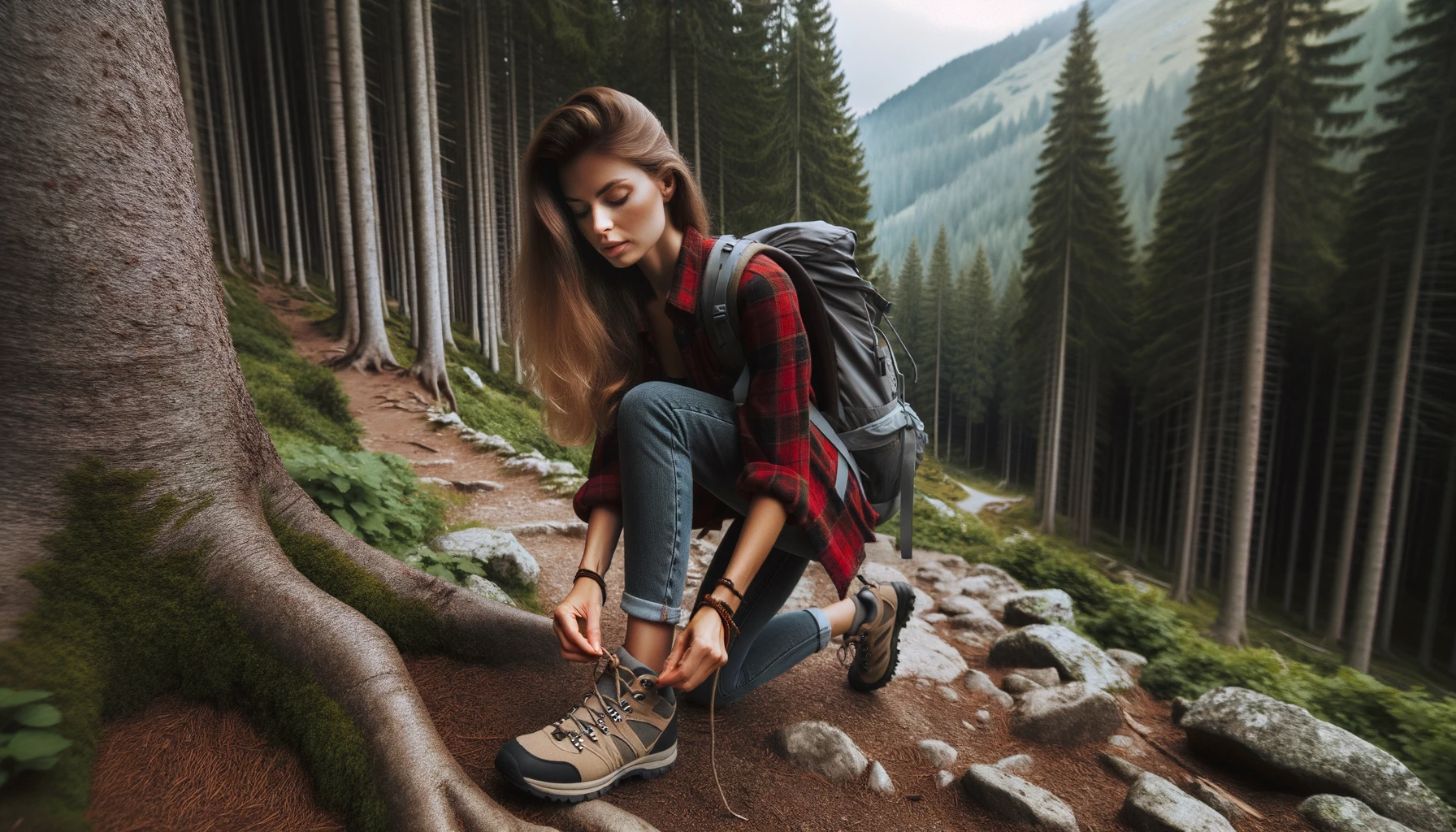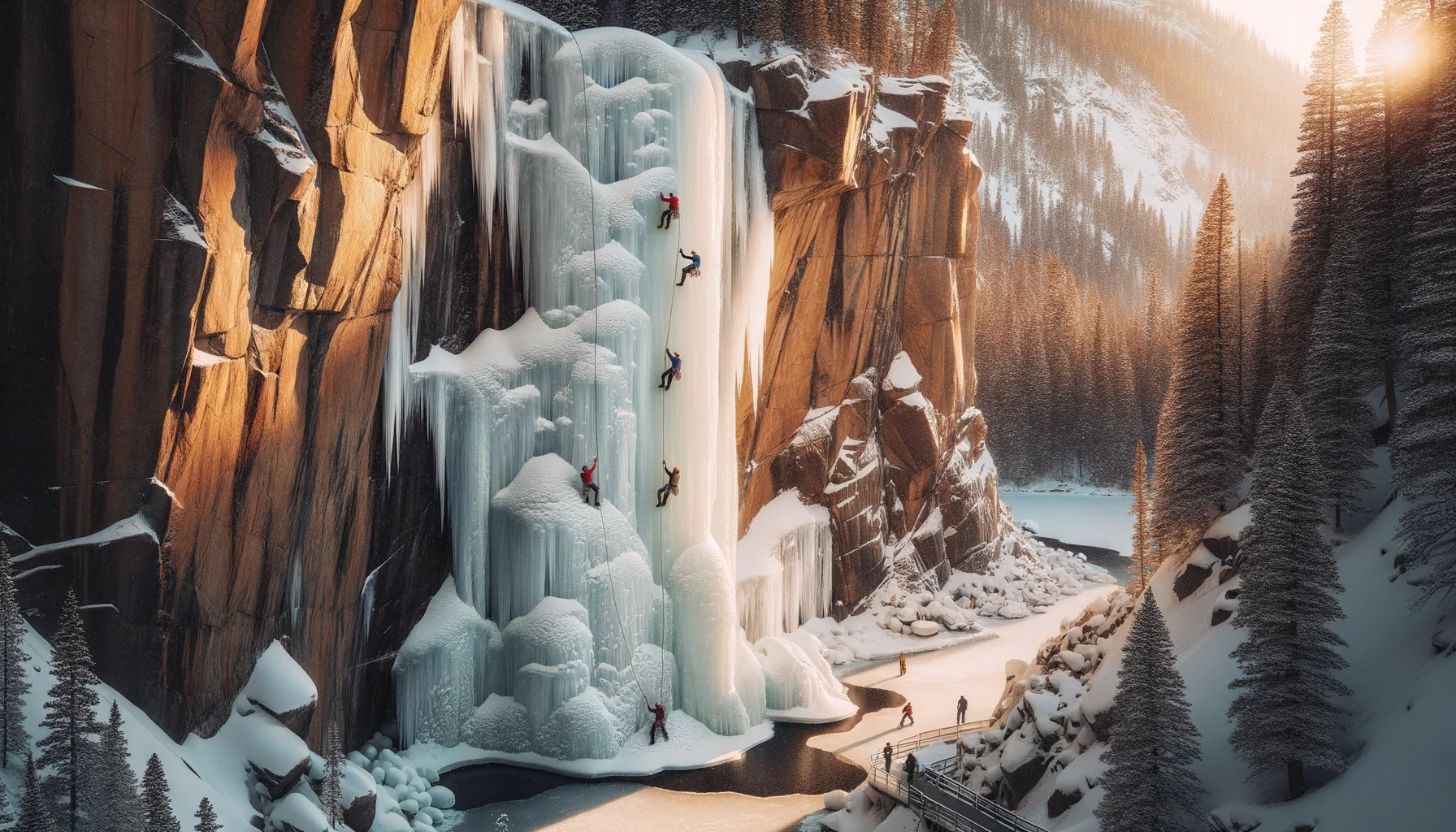Are you ready to step out of your comfort zone and explore the great outdoors? Hiking is a fantastic way to connect with nature, get some exercise, and challenge yourself to new heights. But for beginners, it can be overwhelming to navigate the world of hiking. That’s why we’ve created this comprehensive guide to help you prepare for your first hiking adventure.
From essential tips and advice to the necessary gear and safety precautions, we’ve got you covered. Hiking for beginners doesn’t have to be daunting – with the right information and preparation, you’ll be hitting the trails in no time.
Key Takeaways
- Hiking is a great activity for beginners to connect with nature, get exercise and challenge themselves.
- This comprehensive guide will provide essential tips, advice, and necessary gear for hiking for beginners.
- With proper preparation and the right information, hiking for beginners is not daunting.
- Hiking offers a fantastic opportunity to explore the beautiful outdoors and promote overall wellness.
- Sustainable hiking practices are essential to preserve the environment for future generations.
Why Hiking is a Great Activity for Beginners
As a beginner, hiking is a fantastic way to get outdoors, stay active, and connect with nature. The great thing about hiking is that there are trails to suit all levels of fitness and experience, so you can find a route that’s right for you. Whether you’re looking for a gentle stroll through a local park or a more challenging trek through the mountains, there are plenty of beginner-friendly hiking trails to explore.
Not only is hiking a fun and rewarding activity, but it also offers a range of health benefits. Research has shown that spending time in nature can reduce stress levels, boost mood, and improve overall well-being. Hiking is a low-impact exercise, which means it’s easy on your joints and muscles, making it a great option for people of all ages and fitness levels.
Disclosure: When you buy through links on our site, we may earn an affiliate commission.
Before you hit the trails, make sure you have a hiking for beginners guide handy and check off everything on your hiking for beginners checklist. With a bit of planning and preparation, you’ll be ready to enjoy all the benefits that hiking has to offer.
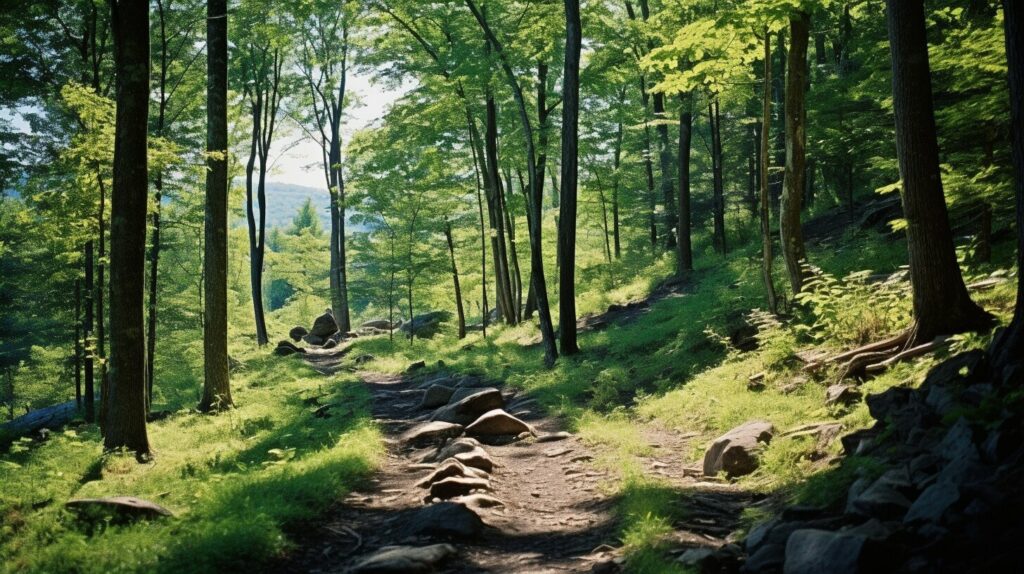
Planning Your Hiking Adventure
Now that you’ve decided to go on a hiking trip, it’s time to plan carefully. Here are some tips and tricks to help make the planning process more manageable.
Assess Your Fitness Level
Before embarking on a hiking trip, it’s essential to assess your fitness level. Determine how much physical activity you can handle and choose a trail that matches your fitness level. If you’re a beginner, start with an easy trail to avoid over-exertion and injury.
Choose the Right Trail
Choosing the right trail is crucial for an enjoyable hiking trip. Look for trails that are beginner-friendly and suitable for your fitness level. Take into consideration the trail length, elevation gain, and difficulty level. Check the weather forecast before you go and choose a trail that’s suitable for the conditions.
Understand Basic Hiking Techniques
Basic hiking techniques are essential for a safe and enjoyable trip. Learn how to use hiking poles, navigate trails, and pace yourself. Understanding basic hiking techniques will make your trip more comfortable and help prevent injury.
Pack Wisely
Packing wisely is critical for a successful hiking trip. Make a checklist of essential items, such as water, snacks, a first aid kit, and extra clothing layers. Wear comfortable, well-fitting hiking shoes or boots and dress in layers that can be removed or added as needed. Don’t forget to pack a map or compass, a whistle, and a flashlight.
Stay Hydrated and Nourished
Staying hydrated and well-nourished is essential for a successful hiking trip. Carry enough water to ensure you’re adequately hydrated throughout the trip. Bring snacks that provide a quick energy boost, such as nuts, granola bars, or dried fruit. Take regular breaks to rest, refuel, and enjoy the scenery.
Plan for Emergencies
Planning for emergencies is crucial for any outdoor activity. Carry a first aid kit and know how to use it. Familiarize yourself with the signs of altitude sickness, dehydration, and hypothermia. Know whom to contact in case of an emergency, and always tell someone your hiking plans and expected return time.
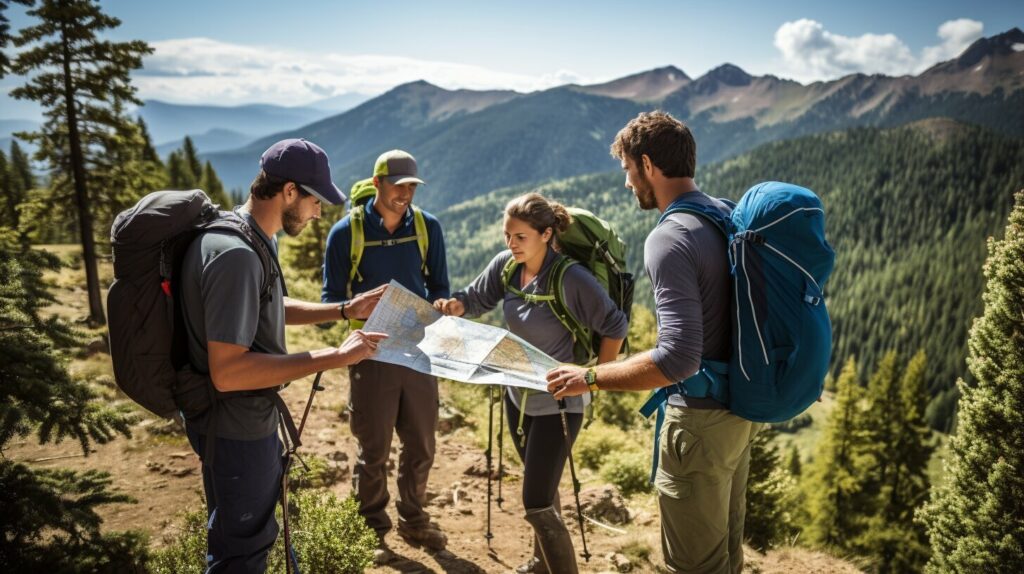
Incorporating these tips and tricks into the planning process can help ensure that your first hiking trip is a success. Remember that hiking is a rewarding experience that requires careful planning and preparation.
Essential Gear for Beginner Hikers
As a beginner hiker, having the right gear can make or break your hiking experience. To ensure your comfort and safety on the trails, here are the essential hiking gear for beginners:
| Item | Description |
|---|---|
| Hiking Boots | A sturdy pair of hiking boots with good ankle support and traction is essential for any hiking trip. Look for ones that fit well and have waterproof materials to keep your feet dry. |
| Clothing Layers | Depending on the weather and the trail difficulty, you’ll need proper clothing layers to keep you warm or cool during the hike. Bring a moisture-wicking base layer, a mid-layer for insulation, and a waterproof jacket to protect you from rain or wind. |
| Backpack | A backpack with ample storage space and a comfortable fit is crucial for carrying your water, snacks, extra clothing, and other gear. Choose one with adjustable straps and a hip belt to distribute the weight evenly on your body. |
| Hiking Poles | While not necessary, hiking poles can provide extra stability and support on uneven or steep terrain. Look for lightweight and adjustable ones with ergonomic grips. |
| Navigational Tools | Even if you’re sticking to well-marked trails, it’s always good to have a map, a compass, or a GPS device (or all of them) to avoid getting lost. Make sure you know how to use them before the trip. |
| First Aid Kit | Accidents can happen, so it’s important to have a basic first aid kit with bandages, antiseptics, pain relievers, and any necessary medications. Also, bring a whistle, a flashlight, and a multi-tool in case of emergencies. |
Remember to test all your gear and break in your hiking boots before the trip to avoid blisters or discomfort. With the right gear, you’ll be able to fully enjoy the beauty of nature without any distractions or discomforts.
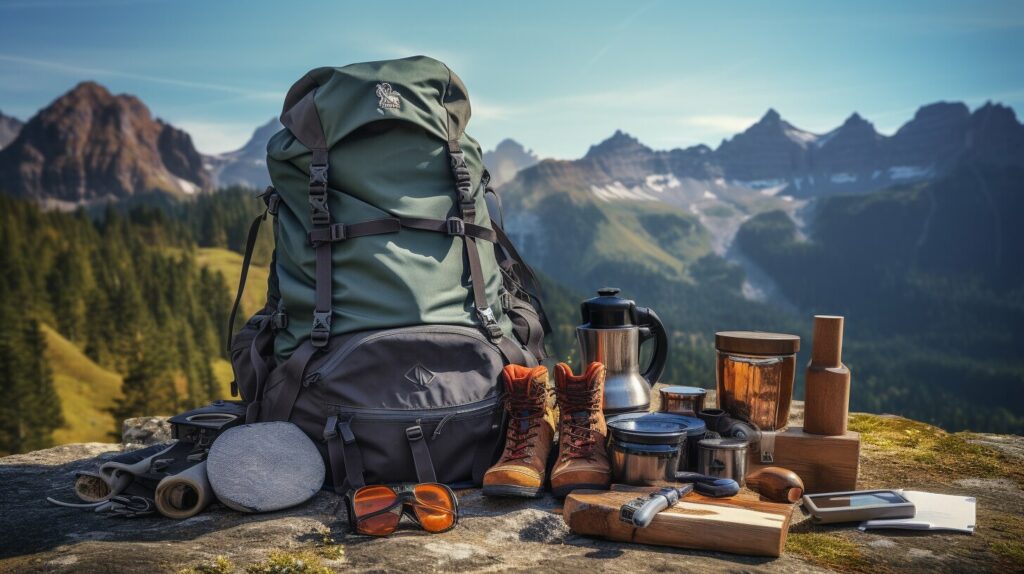
Preparing for a Safe Hiking Trip
When hiking, safety should always be your top priority. As a beginner hiker, it’s essential to take proper precautions to ensure a safe and enjoyable experience on the trails. Here are some important safety tips for beginner hikers:
- Before setting out on your hike, make sure you have a hiking for beginners checklist that includes all of the necessary gear and supplies for your trip.
- Research your hiking trail ahead of time to assess its difficulty level and any potential hazards.
- Check the weather forecast and plan accordingly. Avoid hiking during severe weather conditions, such as thunderstorms or extreme heat.
- Stay hydrated by carrying enough water with you and drinking regularly during your hike.
- Protect yourself from the sun by wearing sunscreen and a hat, and stay cool by wearing lightweight and breathable clothing.
- Stay on designated trails to avoid getting lost or injuring yourself on difficult terrain.
- Be aware of wildlife in the area and keep a safe distance. Never approach or feed wild animals.
- Carry a first aid kit and know basic first aid techniques, such as how to treat blisters and minor injuries.
- Let someone know your hiking plans, including where you’re going and when you expect to return. If possible, hike with a friend or in a group.
- In case of emergency, stay calm and follow proper procedures. Call for help if needed, and use trail markers or landmarks to help rescuers find you.
By following these beginner hiking safety tips, you’ll be well-prepared for your first hiking adventure and able to enjoy the beauty of nature without worrying about potential risks.
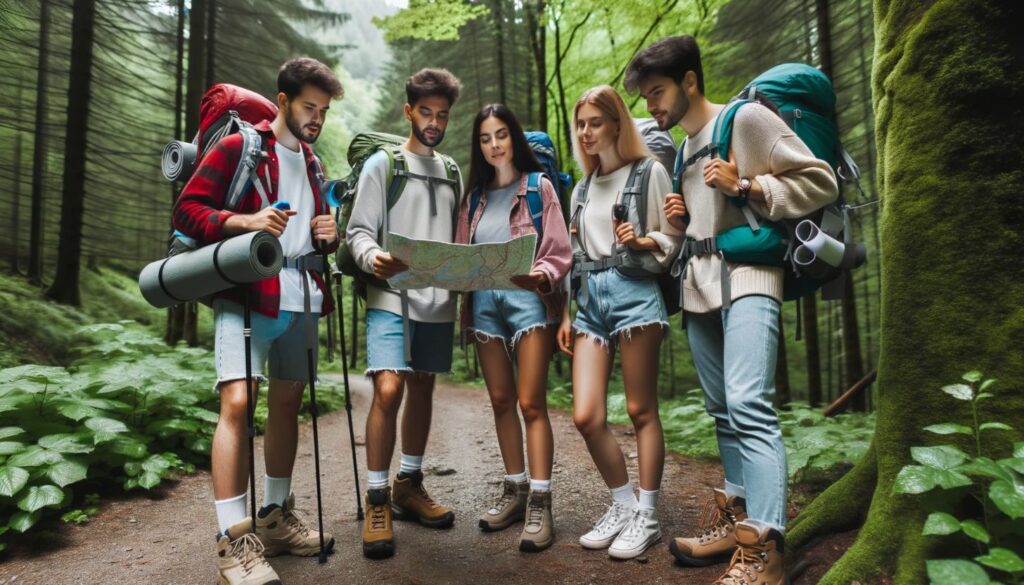
Training Exercises and Techniques
Now that you’ve planned your hiking trip and gathered all the essential gear, it’s time to focus on building your hiking skills. As a beginner, it’s important to start slow and gradually increase your hiking stamina and strength. Here are some training exercises and techniques to help you improve your hiking skills:
Hiking Training Exercises
| Exercise | Description |
|---|---|
| Hill Repeats | Find a steep hill or set of stairs and hike up and down multiple times, gradually increasing the number of repeats. |
| Interval Training | Alternate between periods of hiking at a moderate pace and periods of hiking at a faster pace. |
| Long-Distance Hiking | Gradually increase the distance of your hikes to improve your endurance over time. |
Hiking Techniques
- Navigation: Learn how to read maps and use a compass to stay on the right path.
- Pacing: Find a comfortable hiking pace that allows you to maintain energy and avoid exhaustion.
- Use of Hiking Poles: Use hiking poles to improve balance, reduce impact on joints, and increase stability.
By incorporating these training exercises and techniques into your hiking routine, you’ll improve your hiking skills and be better equipped to tackle more challenging trails in the future.
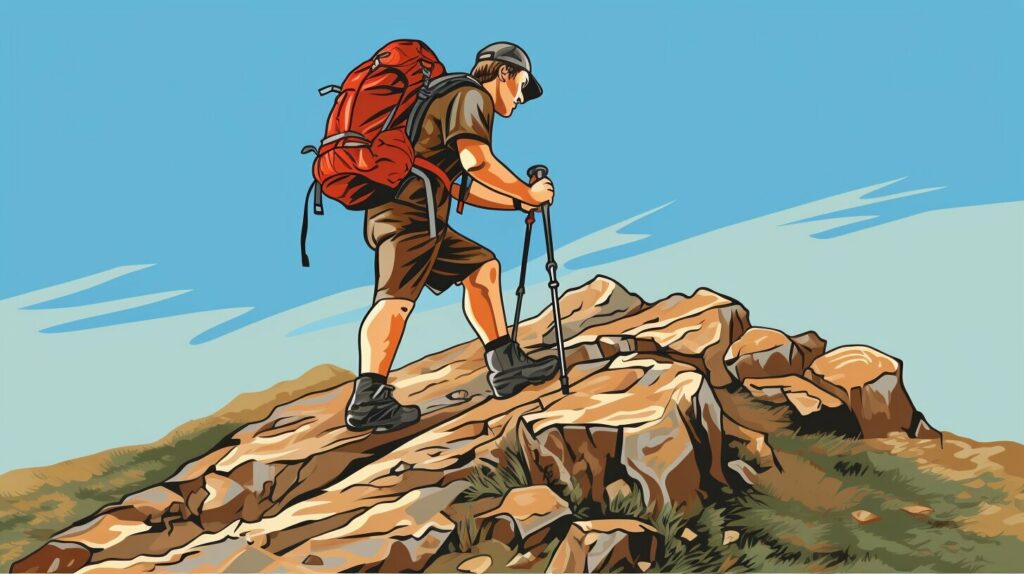
Selecting Beginner-Friendly Hiking Trails
Now that you have learned the necessary hiking tips and techniques, it’s time to hit the trails! As a beginner, it’s important to choose beginner-friendly hiking trails that are easy to navigate and have a moderate difficulty level. Here are some of the best hiking trails across the United States that are perfect for novice hikers:
| Trail Name | Location | Difficulty Level |
|---|---|---|
| Bright Angel Trail | Grand Canyon National Park, AZ | Beginner to moderate |
| Camelback Mountain Summit Trail | Phoenix, AZ | Beginner to moderate |
| Echo Lake Trail | Mount Evans Wilderness, CO | Beginner |
| Mt. Tamalpais State Park | Marin County, CA | Beginner |
| Rocky Mountain National Park | Estes Park, CO | Beginner to moderate |
| Rattlesnake Ledge Trail | North Bend, WA | Beginner |
These trails offer beautiful scenic views and are perfect for beginner hikers. However, keep in mind that hiking conditions may change depending on the time of year, so always check weather reports and trail conditions before heading out.
Remember to also bring a hiking buddy or let someone know where you are going and when to expect you back. Safety should always be a top priority when hiking. Now, lace-up your hiking boots and hit the trails!

Hiking Tips for Beginners
Even though hiking is a rewarding experience, it can also be challenging, especially for beginners. You may encounter physical, mental, or environmental barriers along the way. The good news is that with the right tips and strategies, you can overcome these obstacles and enjoy a successful hike. Here are some hiking tips for beginners to help you overcome challenges:
- Start slow and gradually increase the difficulty level: It’s important to know your limits when hiking. Begin with shorter and easier hikes and work your way up to more challenging trails as you gain experience and fitness.
- Stay hydrated: Dehydration is a common problem among hikers, especially during hot weather. Make sure to carry enough water with you, and drink regularly throughout your hike.
- Take breaks: Resting periodically during your hike can help prevent fatigue and keep you energized. Use breaks to enjoy the scenery, refuel with snacks, and stretch your muscles.
- Pack light: Carrying a heavy backpack can make your hike more challenging than necessary. Bring only essential items and gear, and leave any unnecessary items at home.
- Use hiking poles: Hiking poles can help reduce the impact on your knees and provide stability on uneven terrain. Make sure to use them correctly, and adjust the length to fit your height.
- Maintain a positive attitude: Hiking can be mentally challenging as well. Remember to stay positive, focus on your progress and accomplishments, and enjoy the journey.
By following these hiking tips for beginners, you’ll be able to overcome obstacles and challenges, and have a more enjoyable and successful hike. Keep in mind that every hiker faces challenges, but with perseverance and a positive attitude, you can achieve your outdoor goals. Remember to always prioritize your safety, stay aware of your surroundings, and respect nature.

Multiple Benefits of Hiking
As a beginner hiker, you may be wondering about the benefits of the activity. Hiking not only provides physical exercise but also offers an opportunity to connect with nature and promote overall wellness.
Studies have shown that spending time in nature can reduce stress, anxiety, and depression. Hiking in the great outdoors gives you the chance to take in scenic views, breathe fresh air, and disconnect from technology. Simply being surrounded by trees and natural landscapes can have a positive impact on your mental health and well-being.
Hiking also offers a unique form of exercise that can improve your physical health. It can help you build endurance, strength, and balance while burning calories. Plus, the varied terrain and elevation changes allow you to work different muscles and challenge yourself in new ways.
Additionally, hiking can be a social activity that allows you to spend quality time with friends or family. You can bond over shared experiences, enjoy a picnic at a scenic spot, or simply enjoy each other’s company while exploring the outdoors.
So, the rewards of hiking are many – from physical fitness and mental health to spending time in nature and building relationships with others. Start planning your first hiking trip and experience these benefits for yourself!
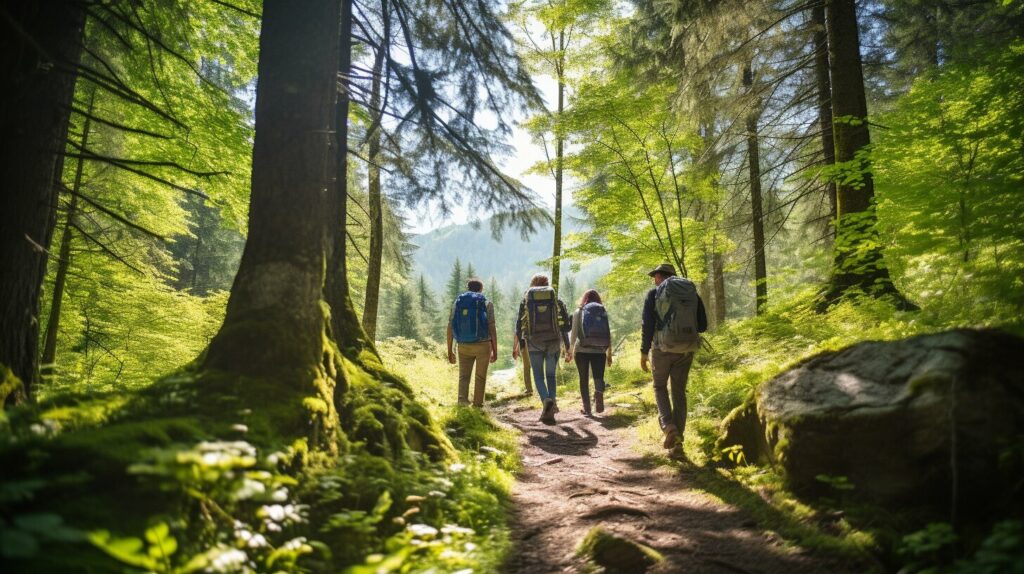
Tips for Sustainable Hiking Practices
As a beginner hiker, it’s important to adopt sustainable practices to preserve the environment. Here are some hiking tips for beginners to minimize their impact on trails, protect wildlife, and maintain a healthy environment:
- Stay on designated trails to avoid damaging natural habitats.
- Leave no trace behind. This means packing out everything you bring in, including food wrappers and other trash.
- Be respectful of wildlife. Keep a safe distance, avoid feeding them, and observe them from a distance.
- Use eco-friendly products like biodegradable soap and sunscreen to reduce pollution in water sources.
- Stay informed about local regulations and restrictions. Some areas may have specific guidelines for hiking and camping.
- Reduce your carbon footprint by carpooling to the trailhead or using public transportation.
- Support conservation efforts by volunteering with local organizations and donating to causes that protect natural resources.
By following these sustainable hiking practices, you’ll help maintain the beauty and integrity of our natural landscapes for generations to come.
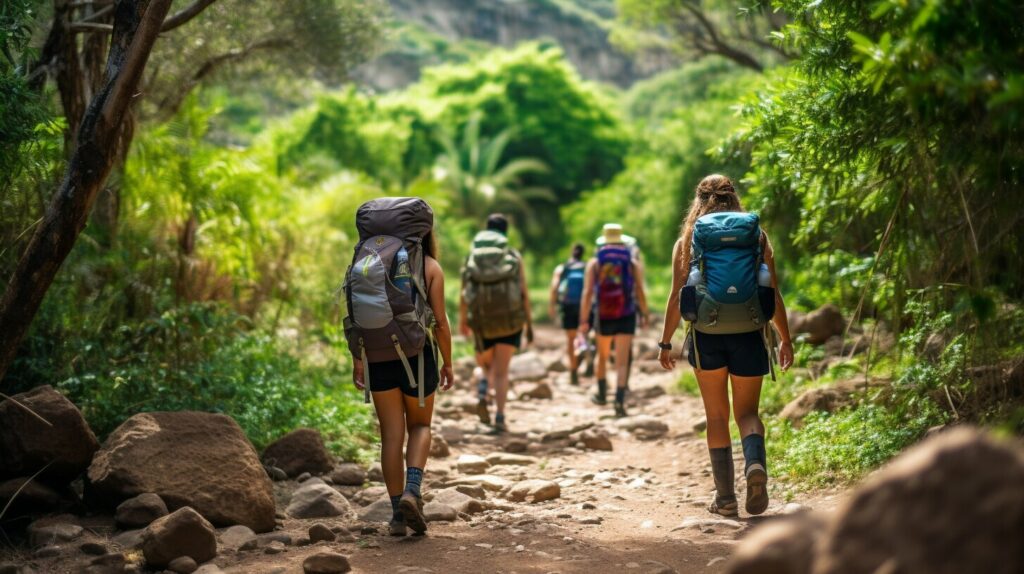
Conclusion
As a beginner hiker, it’s essential to adopt sustainable practices to minimize your impact on the environment. By taking care of nature, you can help preserve it for future generations of hikers to enjoy. Here are some tips on how to incorporate sustainable hiking practices into your outdoor adventures:
Pack Out What You Pack In
When packing for a hike, remember to bring a trash bag with you. You need to take everything back with you, including food wrappers, tissues, and other waste. Leave no trace behind and take everything back to dispose of it properly.
Stay on the Trail
Staying on the trail helps to minimize your impact on the environment. Trails are designed to protect the surrounding plant and wildlife, so avoid cutting corners or forging new paths. By staying on the trail, you also minimize the risk of disturbing sensitive habitats and ecosystems.
Respect Wildlife
When hiking, it’s important to respect the wildlife and their habitats. Avoid disturbing them by giving them plenty of space, not feeding them, and being cautious around nests or dens. Always keep your distance and observe them from a safe distance.
Minimize Your Use of Resources
When hiking, remember to minimize your use of resources, such as water and firewood. Only take what you need and use it efficiently. If there are fire restrictions, use a camp stove instead of starting a fire to minimize your impact on the environment.
By incorporating sustainable practices into your hiking routine, you are not only doing your part to preserve the environment, but you are also setting a good example for others. Now that you have learned about sustainable hiking practices, you’ll be well-equipped to protect the trails and enjoy your outdoor adventures responsibly.
FAQ
What are some beginner-friendly hiking trails?
Some beginner-friendly hiking trails include [insert trail names and descriptions]. These trails offer beautiful scenery and moderate difficulty levels, making them perfect for novice hikers.
What gear do I need for my first hiking trip?
For your first hiking trip, you’ll need essential gear such as hiking boots, comfortable clothing layers, a backpack, water bottles, a navigational tool (e.g., map or GPS), sunscreen, and bug repellent. It’s also important to pack snacks, a first aid kit, and a headlamp or flashlight.
How should I prepare for emergencies while hiking?
It’s important to be prepared for emergencies while hiking. Some key steps include informing someone about your hiking plans, carrying a fully charged phone or emergency communication device, packing a whistle and a signal mirror, and knowing basic first aid. Additionally, familiarize yourself with the specific emergency protocols of the trail or park you’ll be visiting.
What should I do if I encounter wildlife while hiking?
If you encounter wildlife while hiking, it’s essential to stay calm and give the animal space. Back away slowly, avoid eye contact, and make yourself appear larger by raising your arms. Do not run or turn your back on the animal. If it’s a predatory animal, maintain eye contact and make loud noises to deter it. In any wildlife encounter, always prioritize your safety and follow the appropriate guidelines for the specific animal species.
How can I improve my hiking stamina and strength?
To improve your hiking stamina and strength, you can engage in activities such as cardio exercises, strength training, and hiking-specific workouts that target your leg muscles and core. Gradually increasing the intensity and duration of your workouts will help build your endurance over time. Additionally, practicing hiking techniques like pacing and proper breathing can also enhance your overall performance.
What are some common challenges faced by beginner hikers?
Some common challenges faced by beginner hikers include physical fatigue, mental barriers (such as fear of heights or unfamiliarity with trails), and unexpected weather conditions. It’s important to listen to your body, take breaks when needed, and be prepared mentally and physically for potential challenges.
How can hiking benefit my overall wellness?
Hiking offers various benefits for overall wellness. Spending time in nature can improve mental health, reduce stress, and boost mood. Additionally, the physical exercise involved in hiking can increase cardiovascular fitness, strengthen muscles, and contribute to weight management. Being in nature also provides an opportunity for mindfulness and connecting with the natural world.
What are some sustainable hiking practices I can adopt as a beginner?
As a beginner hiker, you can adopt sustainable practices such as staying on designated trails, packing out all trash (including biodegradable items), respecting wildlife and their habitats by observing from a distance, and minimizing campfire impacts. It’s also important to educate yourself on local regulations and guidelines regarding responsible hiking practices.

